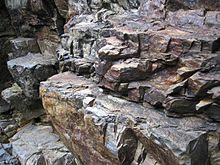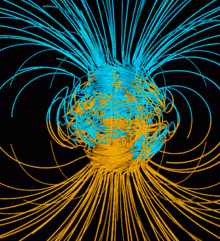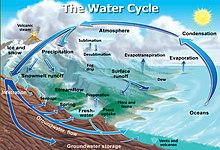Earth science

Earth science or geoscience includes all fields of natural science related to the planet Earth.[1] This is a branch of science dealing with the physical, chemical, and biological complex constitutions and synergistic linkages of Earth's four spheres: the biosphere, hydrosphere/cryosphere, atmosphere, and geosphere (or lithosphere). Earth science can be considered to be a branch of planetary science but with a much older history.
There are reductionist and holistic approaches to Earth sciences. It is also the study of Earth and its neighbors in space. Some Earth scientists use their knowledge of the planet to locate and develop energy and mineral resources. Others study the impact of human activity on Earth's environment, and design methods to protect the planet. Some use their knowledge about Earth processes such as volcanoes, earthquakes, and hurricanes to help protect people from these dangerous events.
Typically, Earth scientists use tools from geology, chronology, physics, chemistry, geography, biology, and mathematics to build a quantitative understanding of how Earth works and evolves. For example, meteorologists study the weather and watch for dangerous storms. Hydrologists examine water and warn of floods. Seismologists study earthquakes and try to understand where they will strike. Geologists study rocks and help to locate useful minerals. Earth scientists often work in the field—perhaps climbing mountains, exploring the seabed, crawling through caves, or wading in swamps. They measure and collect samples (such as rocks or river water), then record their findings on charts and maps.
Geology

Geology is broadly the study of Earth's structure, substance, and processes. Geology is largely the study of the lithosphere, or Earth's surface, including the crust and rocks. It includes the physical characteristics and processes that occur in the lithosphere as well as how they are affected by geothermal energy. It incorporates aspects of chemistry, physics, and biology as elements of geology interact. Historical geology is the application of geology to interpret Earth history and how it has changed over time.
Geochemistry studies the chemical components and processes of the Earth. Geophysics studies the physical properties of the Earth. Paleontology studies fossilized biological material in the lithosphere. Planetary geology studies geoscience as it pertains to extraterrestrial bodies. Geomorphology studies the origin of landscapes. Structural geology studies the deformation of rocks to produce mountains and lowlands. Resource geology studies how energy resources can be obtained from minerals. Environmental geology studies how pollution and contaminants affect soil and rock.[2] Mineralogy is the study of minerals and includes the study of mineral formation, crystal structure, hazards associated with minerals, and the physical and chemical properties of minerals.[3] Petrology is the study of rocks, including the formation and composition of rocks. Petrography is a branch of petrology that studies the typology and classification of rocks.[4]
Earth's interior
This section may contain material
volcanic eruption is the release of stored energy from below Earth's surface.[5]
Earthquakes result from the movement of the lithospheric plates, and they often occur near convergent boundaries where parts of the crust are forced into the earth as part of subduction.[12]
Plate tectonics might be thought of as the process by which the Earth is resurfaced. As the result of seafloor spreading, new crust and lithosphere is created by the flow of magma from the mantle to the near surface, through fissures, where it cools and solidifies Through subduction, oceanic crust and lithosphere vehemently returns to the convecting mantle.[8][10][13] Volcanoes result primarily from the melting of subducted crust material. Crust material that is forced into the asthenosphere melts, and some portion of the melted material becomes light enough to rise to the surface—giving birth to volcanoes.[8][12] Atmospheric science
 (image not to scale.) Atmospheric science initially developed in the late-19th century as a means to forecast the weather through meteorology, the study of weather. Atmospheric chemistry was developed in the 20th century to measure air pollution and expanded in the 1970s in response to acid rain. Climatology studies the climate and climate change.[14] The it would have lost its atmosphere by now if there were no protective magnetosphere.Earth's magnetic field geodynamo .
The magnitude of Earth's magnetic field at its surface ranges from 25 to 65 μT (0.25 to 0.65 G). cosmic rays that would otherwise strip away the upper atmosphere, including the ozone layer that protects Earth from harmful ultraviolet radiation .Hydrology Hydrology is the study of the hydrosphere and the movement of water on Earth. It emphasizes the study of how humans use and interact with freshwater supplies. Study of water's movement is closely related to geomorphology and other branches of Earth science. Applied hydrology involves engineering to maintain aquatic environments and distribute water supplies. Subdisciplines of hydrology include oceanography, hydrogeology, ecohydrology, and glaciology. Oceanography is the study of oceans.[24] Hydrogeology is the study of groundwater. It includes the mapping of groundwater supplies and the analysis of groundwater contaminants. Applied hydrogeology seeks to prevent contamination of groundwater and mineral springs and make it available as drinking water. The earliest exploitation of groundwater resources dates back to 3000 BC, and hydrogeology as a science was developed by hydrologists beginning in the 17th century.[25] Ecohydrology is the study of ecological systems in the hydrosphere. It can be divided into the physical study of aquatic ecosystems and the biological study of aquatic organisms. Ecohydrology includes the effects that organisms and aquatic ecosystems have on one another as well as how these ecoystems are affected by humans.[26] Glaciology is the study of the cryosphere, including glaciers and coverage of the Earth by ice and snow. Concerns of glaciology include access to glacial freshwater, mitigation of glacial hazards, obtaining resources that exist beneath frozen land, and addressing the effects of climate change on the cryosphere.[27] EcologyEcology is the study of the biosphere. This includes the study of nature and of how living things interact with the Earth and one another and the consequences of that. It considers how living things use resources such as oxygen, water, and nutrients from the Earth to sustain themselves. It also considers how humans and other living creatures cause changes to nature.[28] Physical geographyPhysical geography is the study of Earth's systems and how they interact with one another as part of a single self-contained system. It incorporates astronomy, mathematical geography, meteorology, climatology, geology, geomorphology, biology, biogeography, pedology, and soils geography. Physical geography is distinct from human geography, which studies the human populations on Earth, though it does include human effects on the environment.[29] MethodologyMethodologies vary depending on the nature of the subjects being studied. Studies typically fall into one of three categories: observational, experimental, or theoretical. Earth scientists often conduct sophisticated computer analysis or visit an interesting location to study earth phenomena (e.g. Antarctica or hot spot island chains). A foundational idea in Earth science is the notion of Earth history to apply knowledge of how the Earth's processes operate in the present to gain insight into how the planet has evolved and changed throughout long history.
Earth's spheres
In Earth Science, it is common to conceptualize the Earth's surface as consisting of several distinct layers, often referred to as spheres: the air and life. Also included by some are the cryosphere (corresponding to ice) as a distinct portion of the hydrosphere and the pedosphere (corresponding to soil ) as an active and intermixed sphere.
The following fields of science are generally categorized within the Earth sciences:
Earth science breakup
See also
References
Sources
Further reading
External linksWikimedia Commons has media related to Earth sciences. | ||||||||
